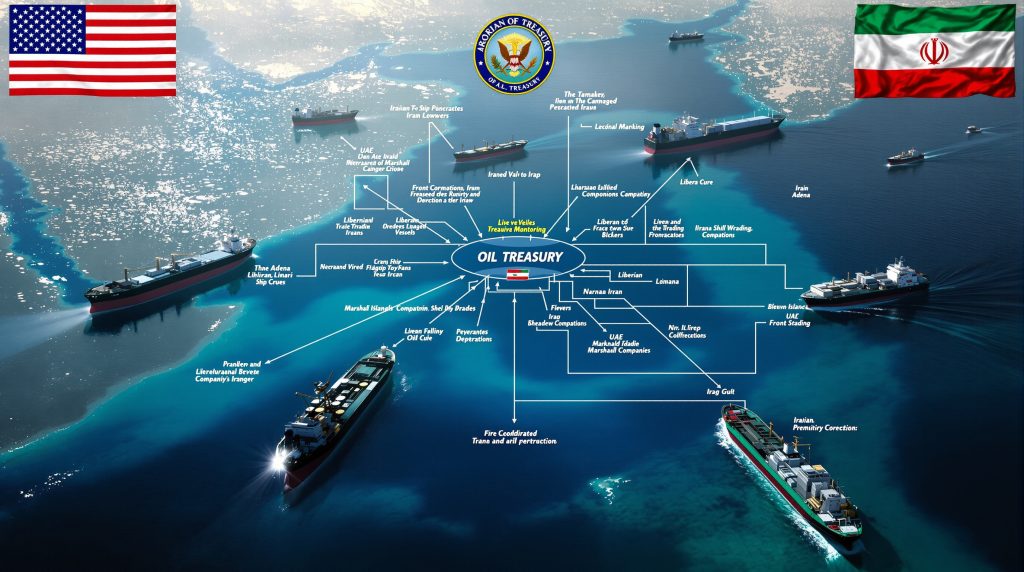How Does Iran Disguise Oil Exports Despite Sanctions?
The United States Treasury Department has unveiled new sanctions targeting a sophisticated network involved in moving Iranian oil internationally by disguising it as Iraqi crude. This operation reveals the complex methods used to circumvent international sanctions and highlights ongoing tensions in global energy markets.
These sanctions target multiple entities and individuals operating across several jurisdictions, demonstrating the elaborate nature of sanctions evasion in the petroleum sector. By examining this case, we can better understand the mechanisms of international oil trading, sanctions enforcement, and geopolitical energy dynamics.
Key Players in the Sanctioned Network
The sanctions specifically target an operation led by Waleed Khaled Hameed al-Samarra'i, an Iraqi-Kittitian businessman based in the United Arab Emirates. Through companies like Babylon Navigation DMCC and Galaxy Oil FZ LLC, this network orchestrated a complex scheme to blend Iranian oil with Iraqi crude, effectively masking its origin.
Several Liberia-flagged vessels were implicated in this operation, including:
- The Adena
- The Liliana
- The Camilla
Additionally, multiple Marshall Islands-registered corporate entities were sanctioned for serving as nominal owners of these vessels, creating layers of obscurity around the true control structure.
What Methods Were Used to Evade Oil Sanctions?
Ship-to-Ship Transfers and Blending Operations
The network employed sophisticated methods to disguise the Iranian origin of the oil:
- Ship-to-Ship Transfers: Conducting transfers in the Arabian Gulf, away from port monitoring
- Blending Operations: Mixing Iranian crude with Iraqi oil to alter its chemical signature
- False Documentation: Creating paperwork identifying the blended product as Iraqi-origin crude
- Port Manipulation: Utilizing Iraqi ports to further legitimize the disguised product
This multi-layered approach demonstrates the complexity of sanctions evasion in the modern oil market, where sophisticated networks can exploit jurisdictional gaps and technical methods to circumvent international restrictions.
The Role of Front Companies and Shell Entities
| Entity Type | Function in Network | Jurisdiction |
|---|---|---|
| Trading Companies | Direct oil sales | UAE |
| Shipping Entities | Transport operations | Liberia |
| Shell Corporations | Vessel ownership | Marshall Islands |
| Operational Entities | Blending and logistics | Multiple regions |
These layered corporate structures create significant challenges for sanctions enforcement, requiring international cooperation and sophisticated tracking methods to identify and disrupt.
Why Are Iranian Oil Sanctions Being Enforced?
U.S. Policy Objectives and Enforcement Strategy
The sanctions fall under Executive Order 13902 and represent a continuation of the "maximum pressure" economic campaign against Iran's petroleum sector. According to Treasury Secretary Scott Bessent, the primary objectives are to:
- Reduce revenue streams funding Iran's weapons programs
- Limit financial support for groups designated as terrorist organizations
- Pressure Iran regarding its nuclear program and regional activities
- Enforce compliance with international sanctions regimes
"Disrupting Iran's oil revenue stream degrades the regime's abilities to carry out attacks against the United States and its allies," stated Treasury Secretary Bessent.
Broader Context of Iran Sanctions
These sanctions occur against a backdrop of stalled nuclear negotiations and ongoing regional tensions. The U.S. has maintained that Iran's oil revenues directly fund activities contrary to international security interests, including:
- Development of ballistic missile technology
- Support for non-state armed groups in the Middle East
- Advancement of nuclear capabilities outside of international monitoring frameworks
What Impact Do Oil Sanctions Have on Global Markets?
Market Effects and Price Implications
Oil sanctions against major producers like Iran can have significant effects on global energy markets:
- Supply Constraints: Removing Iranian oil from legitimate markets reduces global supply
- Price Volatility: Uncertainty around enforcement can lead to price fluctuations
- Regional Trade Shifts: Creation of alternative trading routes and partnerships
- Premium Markets: Development of discount markets for sanctioned oil
These dynamics create both challenges and opportunities for different market participants, from major oil companies to trading firms and consuming nations. Furthermore, the oil price rally often follows major sanctions announcements as markets react to potential supply constraints.
Adaptation and Resilience in Global Oil Trade
The oil market has demonstrated remarkable adaptability to sanctions regimes:
- Trade Rerouting: Sanctioned oil finding alternative buyers through complex channels
- Discount Pricing: Sanctioned oil typically trades at discounts to benchmark prices
- Alternative Payment Systems: Development of non-dollar trading mechanisms
- Technological Evasion: Increasingly sophisticated methods to disguise oil origin and movement
This adaptability highlights the challenges in completely isolating a major oil producer from global markets, despite comprehensive sanctions. In some cases, these sanctions can even trigger an oil price crash if markets overreact or if other producers compensate by increasing output.
How Do Countries Respond to Oil Sanctions?
Strategies of Sanctioned Nations
Countries facing oil sanctions typically employ several strategies:
- Diplomatic Engagement: Seeking exemptions or negotiations to ease restrictions
- Alternative Markets: Developing relationships with countries less aligned with sanctions regimes
- Domestic Consumption Shifts: Redirecting export oil to domestic use
- Industrial Adaptation: Developing refining and petrochemical capacity to add value domestically
- Smuggling Networks: Establishing covert channels for continued exports
These responses demonstrate the complex interplay between sanctions enforcement and adaptation by targeted nations. Analysts monitoring US oil production decline note that sanctions on major producers can become particularly significant during periods of domestic output reduction.
Positions of Major Oil Consumers
Major oil-consuming nations often take varied positions on sanctions:
| Country | Typical Stance on Oil Sanctions | Primary Considerations |
|---|---|---|
| China | Often continues imports with modifications | Energy security, price advantages |
| India | Pragmatic approach balancing relations | Economic priorities, energy needs |
| European Nations | Generally compliant with some exceptions | Alliance considerations, energy diversification |
| Japan/South Korea | Typically compliant with exemption requests | Security alliances, alternative sourcing |
These diverse approaches create a complex global landscape for sanctions enforcement and effectiveness.
What Are the Legal Frameworks for Oil Sanctions?
International and Domestic Legal Mechanisms
Oil sanctions operate through multiple legal frameworks:
- UN Security Council Resolutions: Providing international legitimacy when applicable
- National Legislation: Such as the U.S. International Emergency Economic Powers Act
- Executive Orders: Providing specific implementation guidance and targets
- Secondary Sanctions: Extending reach to non-U.S. entities doing business with sanctioned parties
- Licensing Regimes: Creating exceptions and controlled channels for specific transactions
This multi-layered legal approach creates a complex compliance environment for international businesses. According to Reuters reporting on Iranian oil sanctions, these legal structures often evolve over time to address identified loopholes.
Enforcement Challenges and Jurisdictional Issues
Several factors complicate sanctions enforcement:
- Maritime Law Complexities: Issues of jurisdiction in international waters
- Corporate Veil Piercing: Challenges in identifying ultimate beneficial ownership
- Technological Evasion: Including AIS manipulation and falsified documentation
- Jurisdictional Limitations: Varying enforcement capabilities across different regions
These challenges require sophisticated international cooperation and intelligence sharing to address effectively.
How Effective Are Oil Sanctions as a Policy Tool?
Measuring Impact and Effectiveness
The effectiveness of oil sanctions can be assessed through several metrics:
- Revenue Reduction: Quantifiable decreases in petroleum export revenues
- Behavioral Change: Policy adjustments by targeted governments
- Market Isolation: Degree of exclusion from legitimate trading channels
- Diplomatic Leverage: Creation of negotiating pressure
- Unintended Consequences: Including humanitarian impacts and market distortions
These metrics often yield mixed results, with sanctions showing varying degrees of effectiveness across different contexts. Experts conducting crude oil analysis point to sanctions as a key variable in price forecasting models.
Case Studies and Historical Precedents
Historical examples provide context for current sanctions efforts:
- Iraq Sanctions (1990s): Comprehensive but with significant humanitarian consequences
- Iran Sanctions (2012-2015): Contributed to nuclear negotiations but with adaptation
- Venezuela Sanctions (Recent): Mixed effectiveness with significant market adjustments
- Russia Sanctions (Energy Sector): Targeted approach with adaptation and market shifts
These precedents demonstrate both the potential and limitations of sanctions as a policy tool in the oil sector.
What Are the Future Trends in Oil Sanctions Enforcement?
Technological Developments in Tracking and Enforcement
Several technological advances are changing the sanctions landscape:
- Satellite Monitoring: Enhanced capabilities to track vessel movements
- AI and Big Data: Improved analysis of shipping patterns and anomalies
- Blockchain Applications: Potential for enhanced supply chain transparency
- Chemical Fingerprinting: Advanced methods to identify oil origins
- Financial Intelligence Tools: Better tracking of complex payment channels
These technologies may significantly enhance sanctions enforcement capabilities while prompting more sophisticated evasion techniques.
Evolving Policy Approaches and International Coordination
The future of oil sanctions may include:
- Targeted Precision: More focused sanctions with fewer humanitarian impacts
- Multilateral Coordination: Enhanced international cooperation on enforcement
- Incentive Structures: Combining sanctions with positive incentives for compliance
- Adaptive Frameworks: More flexible approaches responding to market changes
- Sectoral Integration: Coordinating oil sanctions with financial and technology restrictions
These evolving approaches reflect lessons learned from previous sanctions regimes and adaptation to changing global dynamics. The oil futures outlook increasingly incorporates sanctions risk as a key variable for both WTI and Brent contracts.
FAQ: Understanding Oil Sanctions and Enforcement
How do sanctions specifically target oil trading networks?
Sanctions typically target multiple elements of oil trading networks, including:
- Vessel owners and operators
- Trading companies and intermediaries
- Financial facilitators and payment processors
- Insurance providers for shipments
- Port facilities and storage infrastructure
This comprehensive approach aims to disrupt the entire supply chain rather than just individual components.
Can sanctioned oil be detected through technical means?
Yes, several methods can help identify sanctioned oil:
- Chemical composition analysis to determine origin
- Isotope testing to match crude to specific fields
- Documentation verification through international databases
- Vessel tracking to identify suspicious shipping patterns
- Financial transaction analysis to detect unusual payment flows
These technical approaches are increasingly sophisticated but face countermeasures from evasion networks.
How do oil sanctions affect global energy security?
Oil sanctions can impact energy security through:
- Reducing available supply in legitimate markets
- Creating price volatility during enforcement actions
- Shifting trading patterns and transportation routes
- Encouraging development of alternative energy sources
- Prompting strategic reserve policies in consuming nations
These effects vary significantly based on market conditions and the scale of the sanctioned producer.
What role do private companies play in sanctions compliance?
Private sector entities have significant responsibilities:
- Due diligence on trading partners and supply chains
- Compliance programs to identify potential violations
- Risk assessment for operations in sensitive regions
- Reporting suspicious activities to authorities
- Implementing technical solutions for tracking and verification
Corporate compliance has become increasingly important as sanctions regimes have grown more complex.
Conclusion: The Continuing Evolution of Oil Sanctions
The recent U.S. sanctions against networks moving Iranian oil disguised as Iraqi crude highlight the ongoing challenges in enforcing international restrictions on petroleum trade. These actions demonstrate both the sophistication of evasion networks and the determination of enforcement authorities to disrupt them.
As global energy markets continue to evolve, sanctions will likely remain a significant policy tool, though their implementation and effectiveness will be shaped by technological developments, market adaptations, and geopolitical shifts. The cat-and-mouse game between sanctions enforcers and evasion networks reflects broader tensions in international relations and energy security.
Understanding these dynamics is crucial for policymakers, market participants, and analysts seeking to navigate the complex intersection of energy markets, international law, and geopolitics in an increasingly interconnected world.
Further Exploration:
Readers interested in learning more about international oil sanctions and energy geopolitics can also explore related educational content, such as Oilprice.com's article on Iranian oil sanctions, which offers additional perspectives on recent developments in global energy markets.
Ready to Stay Ahead of Market-Moving Discovery Announcements?
Discover how you can gain immediate insights into significant ASX mineral discoveries with Discovery Alert's proprietary Discovery IQ model, transforming complex market data into actionable trading opportunities. Visit the Discovery Alert discoveries page to understand how major mineral discoveries have historically generated substantial returns for informed investors.




